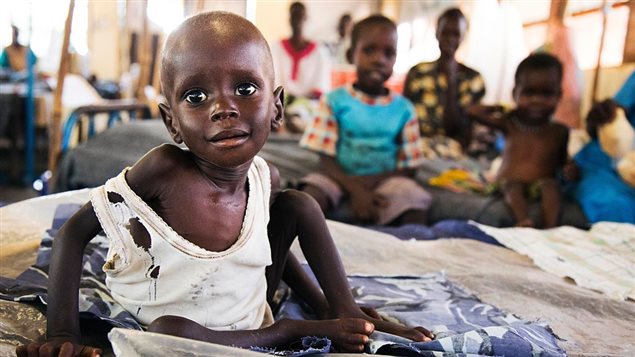A deadly combination of civil war and a devastated subsistence economy already under stress from climate change have left more than 100,000 people facing starvation in parts of South Sudan, according to three UN agencies and their partner NGOs.
The Food and Agriculture Organization of the United Nations (FAO), the United Nations Children’s Fund (UNICEF) and the World Food Programme (WFP) warned that an additional one million people are classified as being on the brink of famine, with that number expected to rise to 5.5 million by mid-summer if nothing is done to resolve the food crisis.
Help us spread the word that #famine was officially declared today in parts of #SouthSudan. RT & share to raise awareness on #malnutrition. pic.twitter.com/VNah0y9NLE
— UNICEF South Sudan (@unicefssudan) February 20, 2017
Nearly five million people, more than 40 per cent of South Sudan’s population, are in need of urgent food, agriculture, and nutrition assistance, according to the three UN agencies and their partners.
“Famine has become a tragic reality in parts of South Sudan and our worst fears have been realised. Many families have exhausted every means they have to survive,” FAO Representative in South Sudan Serge Tissot said in a statement. “The people are predominantly farmers and war has disrupted agriculture. They’ve lost their livestock, even their farming tools. For months there has been a total reliance on whatever plants they can find and fish they can catch.”
Jacquelyn Wright, vice president of international programs at CARE Canada, who was in South Sudan in June 2016, said the NGO, which supports several communities in the world’s youngest country, has been following closely the Integrated Food Security Phase Classification (IPC) updates and wasn’t surprised by today’s announcement.
“The conflict has done many things,” Wright said in a telephone interview from Ottawa. “It’s driven people out of the country, for example many people are fleeing to Uganda and Kenya, it has really driven up the prices and hurt the economy, the inflation is ridiculous.”
All of this is also being exacerbated by the ongoing effects of climate change, Wright said.
Famine has hit parts of #SouthSudan. Nearly 5M people urgently need food, agriculture & nutrition assistance → https://t.co/KqFxZnqLtg pic.twitter.com/JQ1UAqAVX1
— World Food Programme (@WFP) February 20, 2017
Wright called on the Canadian government to step up its diplomatic efforts to help resolve the four-year-old conflict in South Sudan.
“It’s pretty straightforward,” Wright said. “The only way that this is going to be solved is trough political means. The conflict needs to end.”
The federal government and ordinary Canadians also need to step up their financial contributions to humanitarian assistance, she said.
“Humanitarian funding is just so necessary right now,” Wright said. “So many families have nothing to eat but leafs and roots, and it’s the utmost urgency to prevent more people from dying of hunger. We really need to deliver food and humanitarian assistance today.”







For reasons beyond our control, and for an undetermined period of time, our comment section is now closed. However, our social networks remain open to your contributions.